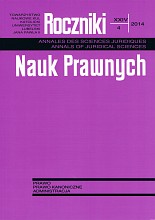Pojęcie patrimonium stabile
The concept of patrimonium stabile
Author(s): Paweł KaletaSubject(s): Law, Constitution, Jurisprudence
Published by: Towarzystwo Naukowe KUL & Katolicki Uniwersytet Lubelski Jana Pawła II
Keywords: ecclesiastical goods; alienation; extraordinary administration
Summary/Abstract: The patrimonium stabile is a new concept in the 1983 Code. It comprises of moveable and im-movable goods, which by the legitimate designation (legitima assignatione) of the competent eccle-siastical authority were established as a secure basis for the existence of juridical person for the fu-ture. Patrimonium stabile allows the independent fulfillment of the mission of the juridical person for which it was established and therefore is subject to legal protection in accordance with the law. The distinction between stabile and non stabile patrimonium should be recorded regularly in the up-dated inventories (can. 1283, 2º). Administrators cannot make gifts for pious purposes or Christian charity out of the movable goods which is part of the patrimonium stabile (cf. can. 1285). In order to make any act of alienation of ecclesiastial goods, stating patrimonium stabile, administrators are required to observeve can. 1291-1294 and can. 638 § 3, whenever their value exceeds the sum determined by law. Canons on alienation (can. 1291-1294) should be obseved not only in alienation, but also in any dealings in which the patrimonial condition of the juridical person may be jeopardised (can. 1295). Patrimonium stabile is not subject to taxation, but the income derived from it may be taxed (see. can. 264 § 2 and can. 1263).
Journal: Roczniki Nauk Prawnych
- Issue Year: 25/2014
- Issue No: 4
- Page Range: 147-161
- Page Count: 15
- Language: Polish

